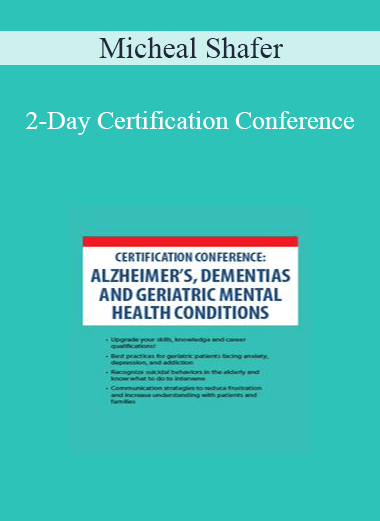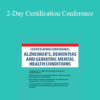$439.99 Original price was: $439.99.$83.00Current price is: $83.00.
[Instant Download] – Immediately deliver the download link after receiving the payment
 Purchase this course you will earn 83 Points worth of $8.30
Purchase this course you will earn 83 Points worth of $8.30Elevate your skills with the Micheal Shafer – 2-Day Certification Conference: Alzheimer’s, Dementias and Geriatric Mental Health Conditions course, available for just $439.99 Original price was: $439.99.$83.00Current price is: $83.00. on Utralist.com! Browse our curated selection of over 60,000 downloadable digital courses across diverse Uncategorized. Benefit from expert-led, self-paced instruction and save over 80%. Start learning smarter today!
[Instant Download] – Immediately deliver the download link after receiving the payment
Purchase Micheal Shafer – 2-Day Certification Conference: Alzheimer’s, Dementias and Geriatric Mental Health Conditions courses at here with PRICE $439.99 $83
- Faculty:
- Micheal Shafer
- Duration:
- 13 Hours
- Format:
- Audio and Video
- Copyright:
- Aug 27, 2020
Description
Handouts
| Manual (Black & White Slides) (25.3 MB) | 98 Pages | Available after Purchase | |
| Manual (Color Slides) (22.6 MB) | 98 Pages | Available after Purchase |
Outline
DAY 1
Dementia Differentiation, Diagnosis and Prognosis
- Types of dementia and how to differentiate between them
- Pseudo-dementia explanations
- Mild Neuro-Cognitive Disorder
- Diagnosis, prognosis, and stages
- The latest preventative treatments
Cognitive Assessment Essentials
- Mini-Mental State Examination
- SLUMS
- Administration and scoring
- Objective and subjective interpretation
Challenging Behavior Toolbox:
Trigger Identification, Problem Solving, and Compassionate Intervention Strategies
- Individualizing care – strengths and limitations
- Pain and pain assessment
- Tactics for verbal and physical combativeness
- Agitation – triggers, pain and care planning
- Delusions and hallucinations — potential causes and complications
- Wandering – redirection techniques to reduce risks
- Tips for working with sundowners
- Sexual expressiveness and interventions for dignity
- Activities of Daily Living – structure and engagement strategies
Verbal and Non-Verbal Strategies for Communication:
Reduce Frustration and Increase Understanding with Dementia Patients
- When traditional communication is replaced by behaviors
- Person centered: Gathering beliefs and values
- Effective tips for communicating with dementia patients
- Find the meaning behind the gesture
- How to avoid arguments
- What questions to ask, and how to ask them
- Meaningful activities that connect
Tips and Tactics for Successfully Working with Caregivers
- Family dynamics
- Validation, empathy and active listening
- Caregiver burnout and where to go for help
- End of life issues
- Ethical issues and abuse
DAY 2
How Aging Impacts Mental Health
- The aging brain, body and unique stressors of late life
- Social systems, stigma and life role transitions
- How medical illness impacts mental health
Geriatric Pharmacology:
Essential Considerations for Safety and Effectiveness
- The senior metabolism and unique safety concerns
- Common side effect of drugs on seniors
- Interactive effects to be aware of
Late-Life Depression:
Assessment and Interventions
- Assessment strategies for late-life depression
- The role of social support
- Working with grief and loss
- Cognitive approaches to focus on today’s problems
- Adaptive exercise solutions for the physically challenged
Suicide in Older Adults:
How to Recognize the Warning Signs and Properly Intervene
- The complexity of suicidal behavior in older adults
- Assessment and screening tools
- Treatment approaches and crisis guidance
Alcohol and Drug Use in the Elderly
- Unique vulnerabilities and diagnostic difficulties
- Assessment instruments
- Motivational Interviewing and relapse prevention strategies
Late-Life Anxiety:
Identification and Treatment Strategies Adapted to Older Adults
- Risk factors, stressors and symptoms
- Loss of social support and fear of being alone
- Medical issues and hypochondria
- Evidence-based psychological treatments
Trauma-Informed Treatment of Older Adults
- What the latest research tells us – and what it doesn’t
- Special considerations when assessing seniors for trauma
- Trauma and somatic complaints
The Role of Nutrition in Geriatric Behavioral Problems
- How vitamin and mineral deficiencies impact behavior
- How the volatility of blood sugar can impact behavior
- Strategies for non-compliant eating
Faculty
Micheal Shafer, Ph.D. Related seminars and products: 1
Micheal Shafer Ph.D. is a clinical psychologist who specializes in the diagnosis and treatment of people with dementia. Dr. Shafer holds multiple teaching positions in the Michigan State University School of Medicine in the departments Physical Medicine and Rehabilitation and Radiology.
Dr. Shafer lectures nationally on a variety of clinical and research issues, and has conducted numerous trainings for physicians about medication utilization and mechanisms of actions, particularly for those used to treat Alzheimer’s Disease. His primary research/clinical interests include the assessment of neuropsychological disorders (e.g., stroke, traumatic brain injury (TBI), Alzheimer’s) and the study of localized brain functioning. Prior to earning his Ph.D., Dr. Shafer provided hospital-based counseling services and conducted research at the University of Maryland Medical School.
Dr. Shafer earned his M.A. degree in applied psychology from the University of Baltimore and his Ph.D. in clinical psychology with an emphasis on neuropsychology from the University of North Texas.
Speaker Disclosures
Financial: Micheal Shafer Ph.D. has an employment relationship with Michigan State University School of Medicine in the departments of Physical Medicine and Rehabilitation and Radiology. Dr. Shafter is a staff psychologist at PAR Rehab Services. He conducts trainings and lectures nationally. Dr. Shafer receives a speaking honorarium from PESI, Inc.
Non-financial: Micheal Shafer Ph.D. is a board member of the Michigan Rehabilitation & Research Corporation (MRRC) and a Chapter Board Member of the Alzheimer’s Assocation. Dr. Shafer holds professional memberships in the Clinical Neuropsychology (Division 40, APA), the American Psychological Association (APA), and the National Academy of Neuropsychology (NAN).
Purchase Micheal Shafer – 2-Day Certification Conference: Alzheimer’s, Dementias and Geriatric Mental Health Conditions courses at here with PRICE $439.99 $83
Cultivate continuous growth with the Micheal Shafer – 2-Day Certification Conference: Alzheimer’s, Dementias and Geriatric Mental Health Conditions course at Utralist.com! Unlock lifetime access to premium digital content, meticulously designed for both career advancement and personal enrichment.
- Lifetime Access: Enjoy limitless access to your purchased courses.
- Exceptional Value: Benefit from savings up to 80% on high-quality courses.
- Secure Transactions: Your payments are always safe and protected.
- Practical Application: Gain real-world skills applicable to your goals.
- Instant Accessibility: Begin your learning journey immediately after buying.
- Device Compatible: Access your courses seamlessly on any device.
Transform your potential with Utralist.com!
Related products
Uncategorized
Managing Patient Emergencies: Critical Care Skills Every Nurse Must Know – Dr. Paul Langlois
= 85 Points
= 72 Points
= 84 Points
Uncategorized
= 35 Points
Uncategorized
= 35 Points
Uncategorized
Legal Risks in Nursing Documentation – Use Extreme Caution When Skimming the Facts – Rosale Lobo
= 40 Points
Uncategorized
Cognitive Rehabilitation Therapy: Practical Interventions and Personalized Planning – Jane Yakel
= 85 Points
Uncategorized
= 85 Points


![[Audio] EP17 Speech with Discussant 04 - Beyond Therapy: Living and Telling in Community - Erving Polster](https://utralist.com/wp-content/uploads/2023/04/Audio-Only-EP17-Speech-with-Discussant-04-Beyond-Therapy-Living-and-Telling-in-Community-Erving-Polster-PhD-and-Michael-Yapko-PhD-100x100.png)


